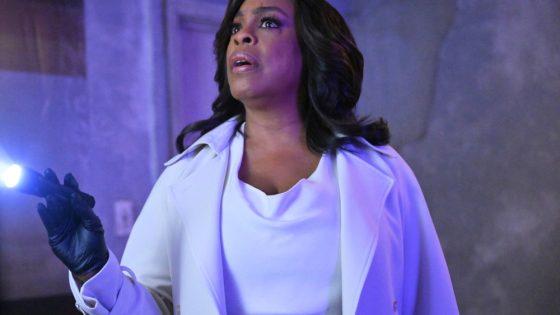There’s a listlessness to “Grotesquerie,” the new FX horror drama that is not a season of “American Horror Story” for reasons known only to co-creator Ryan Murphy. Ostensibly, the series pits grizzled detective Lois (Niecy Nash) against the titular serial killer, who contorts his victims’ corpses into Biblical tableaus. But rather than play up the murders’ shocking gore or give momentum to Lois’ investigation, the first few episodes are content to linger in the investigator’s ennui. Whether staring out her car window or slugging down a drink, Lois seems to experience her latest case as a metaphor for her inner anguish. The satisfaction of watching Nash in a dramatic leading role is countered by the inertia of the show she fronts.
“Grotesquerie” underwhelms on its own. But the series also acts as a symbol of a broader creative malaise within the Murphy-verse — a strange moment in the super-producer’s storied career that pairs unprecedented quantity with diminished quality. “Grotesquerie” is one of six concurrently airing Murphy shows this fall, across four different platforms and two different corporate umbrellas. After inking a new overall deal with Disney last year, Murphy has launched — pun intended — cruise ship procedural “Doctor Odyssey” on ABC, in addition to “Grotesquerie.” From his last stint at Disney, before defecting to Netflix in 2018, first responder drama “9-1-1” and its spinoff “9-1-1: Lone Star” still air on ABC and Fox, respectively, and “American Sports Story: Aaron Hernandez” has inaugurated another branch of the anthology franchise that already spans “American Horror Story,” “American Horror Stories” and “American Crime Story.” (“American Love Story,” centered on John F. Kennedy Jr. and Carolyn Bessette, is in the works.) And Murphy maintains a presence on Netflix via “Monsters,” the true crime hit that has moved from Jeffrey Dahmer to the Menendez Brothers in its second season.
When consumed in the aggregate, these shows start to blur into each other. As Vanity Fair columnist Dominick Dunne, Nathan Lane reprises a role in “Monsters” that was played by Robert Morse in the first season of “American Crime Story,” and echoes the writer-as-socialite aura of Tom Hollander’s Truman Capote, the center of January’s installment of “Feud.” A character in “Grotesquerie” shouts out Ed Gein, the recently announced subject of “Monster” Season 3; that character is played by Nicholas Alexander Chavez, who just broke out as Lyle Menendez in “Monster” Season 2. “American Crime Story” began with the saga of an NFL star on trial for murder; eight years later, “American Sports Story” is doing the same, raising the same question as “Grotesquerie” regarding why it’s an entirely new show.
Even when he isn’t writing or showrunning, Murphy has always had creative signatures that span his sprawling empire. (“Doctor Odyssey” having a passenger go overboard in the series premiere is a lot like “9-1-1” opening with a live infant stuck in a plumbing pipe: You can’t jump the shark if you start in mid-air!) But these parallels feel less like shared DNA than the result of drawing on finite and dwindling creative resources. “Monsters” is certainly doing numbers, but it’s a tonally muddled mess that buries a harrowing portrait of sexual abuse under tacky sensationalism. Of the half-dozen Murphy shows currently on the air, none surpasses the level of respectful reenactment (“American Sports Story”) or breezy distraction (“Doctor Odyssey,” a “Love Boat” redux spiked with Joshua Jackson’s millennial nostalgia in human form). Fifteen years after “Glee” made him TV royalty, have we finally reached Ryan Murphy overload?
Whatever the Murphy oeuvre’s flaws — a trollish taste for provocation; a tendency to fall apart after a strong beginning — it has long led the culture. At the Obama era’s onset, “Glee” was a high-water mark for mainstream queer representation, both in content and arch, campy style. With the seasonal anthology, “American Horror Story” opened the floodgates for a new epoch of prestige TV, including movie stars enticed by a more limited time commitment. And “The People v. O.J. Simpson” was among the first pieces of popular media to reexamine a ‘90s tabloid scandal, a treatment soon extended to vilified figures like Tonya Harding and Lorena Bobbitt.
This visionary quality is notably lacking in the current crop of shows. If anything, the latest Murphy projects feel like lagging indicators of the broader zeitgeist. For the first few years, Murphy’s Netflix era was marked by ambitious, if unsuccessful, swings like sociopath character study “The Politician” or revisionist history “Hollywood.” After these interesting failures, the Dahmer “Monster” read like raw meat thrown at the true-crime obsessed: popular, but not especially distinct from the ocean of documentaries and scripted adaptations already available on its streaming service. “American Horror Story,” whether “Grotesquerie” is an official part of it or not, marks its 13th anniversary this weekend. “9-1-1” is certainly a Murphy-esque take on the broadcast procedural, but ultimately it’s just that: a broadcast procedural.
One only needs to revolutionize television once to secure one’s legacy. Nor has Murphy entirely lost his touch; he remains extraordinarily gifted at casting, both in crowning new stars (Menendez actors Chavez and Cooper Koch) and repositioning the careers of established ones (Nash won an Emmy for her work on the Dahmer season of “Monster”). And of this year’s many Murphy projects, I credit “Feud: Capote vs. the Swans” — written by Jon Robin Baitz and largely directed by Gus van Sant — with attempting something new: a melancholy study of middle age and the unique bond between gay men and tragic, glamorous women. Finally, there’s the undeniable impact of Murphy’s reach, creative merit aside: the real-life Menendez brothers will soon receive a new court hearing, the timing of which appears directly connected to the “Monsters” release.
It nonetheless bears pointing out that the line separating prolific output from diluted focus lies firmly in Murphy’s rearview mirror. “Monsters” has some truly great elements, like the episode dedicated entirely to Erik’s account of his abuse; more time and care could have brought the rest of the season up to that level. “Grotesquerie” contains an unhinged Lesley Manville performance, as a nurse who may be exploiting Lois’ comatose husband, that seems to be beamed in from an entirely different show. “American Sports Story” is appropriately somber, while also lacking Murphy’s signature puckish wink.
Throughout his career, Murphy has defied easy categorization. He’s a premium cable artiste and a purveyor of mass entertainment, a proud social progressive who also thumbs his nose at political correctness. But his current slate is firmly weighted away from the highbrow and toward quick, copious production, a successful gambit with clear tradeoffs. In 2024, Ryan Murphy is more of a mogul and less of an auteur.
Source Agencies



